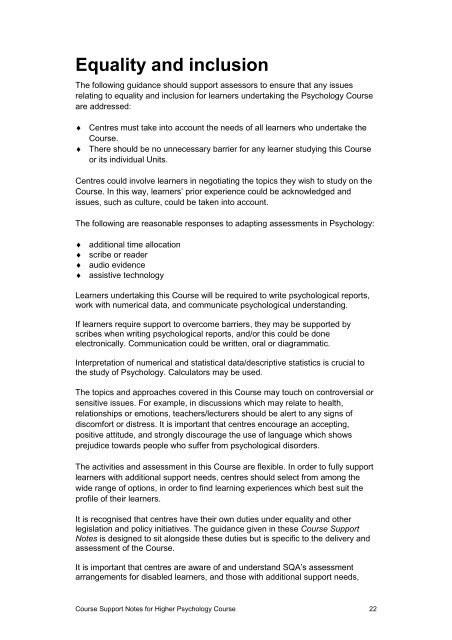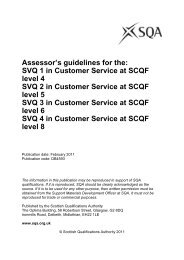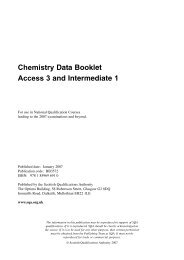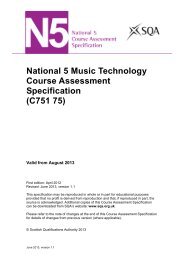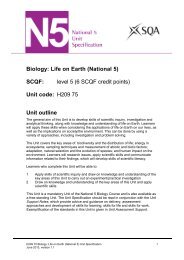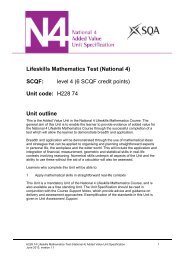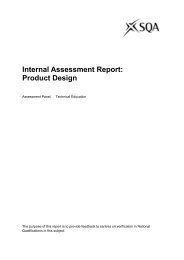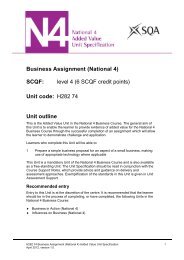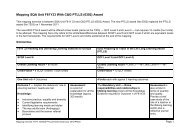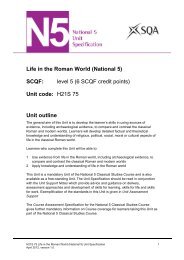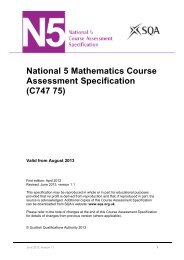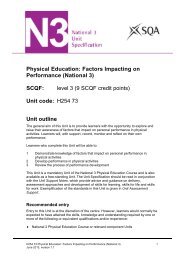Higher Psychology Course Support Notes - Scottish Qualifications ...
Higher Psychology Course Support Notes - Scottish Qualifications ...
Higher Psychology Course Support Notes - Scottish Qualifications ...
Create successful ePaper yourself
Turn your PDF publications into a flip-book with our unique Google optimized e-Paper software.
Equality and inclusion<br />
The following guidance should support assessors to ensure that any issues<br />
relating to equality and inclusion for learners undertaking the <strong>Psychology</strong> <strong>Course</strong><br />
are addressed:<br />
Centres must take into account the needs of all learners who undertake the<br />
<strong>Course</strong>.<br />
There should be no unnecessary barrier for any learner studying this <strong>Course</strong><br />
or its individual Units.<br />
Centres could involve learners in negotiating the topics they wish to study on the<br />
<strong>Course</strong>. In this way, learners’ prior experience could be acknowledged and<br />
issues, such as culture, could be taken into account.<br />
The following are reasonable responses to adapting assessments in <strong>Psychology</strong>:<br />
additional time allocation<br />
scribe or reader<br />
audio evidence<br />
assistive technology<br />
Learners undertaking this <strong>Course</strong> will be required to write psychological reports,<br />
work with numerical data, and communicate psychological understanding.<br />
If learners require support to overcome barriers, they may be supported by<br />
scribes when writing psychological reports, and/or this could be done<br />
electronically. Communication could be written, oral or diagrammatic.<br />
Interpretation of numerical and statistical data/descriptive statistics is crucial to<br />
the study of <strong>Psychology</strong>. Calculators may be used.<br />
The topics and approaches covered in this <strong>Course</strong> may touch on controversial or<br />
sensitive issues. For example, in discussions which may relate to health,<br />
relationships or emotions, teachers/lecturers should be alert to any signs of<br />
discomfort or distress. It is important that centres encourage an accepting,<br />
positive attitude, and strongly discourage the use of language which shows<br />
prejudice towards people who suffer from psychological disorders.<br />
The activities and assessment in this <strong>Course</strong> are flexible. In order to fully support<br />
learners with additional support needs, centres should select from among the<br />
wide range of options, in order to find learning experiences which best suit the<br />
profile of their learners.<br />
It is recognised that centres have their own duties under equality and other<br />
legislation and policy initiatives. The guidance given in these <strong>Course</strong> <strong>Support</strong><br />
<strong>Notes</strong> is designed to sit alongside these duties but is specific to the delivery and<br />
assessment of the <strong>Course</strong>.<br />
It is important that centres are aware of and understand SQA’s assessment<br />
arrangements for disabled learners, and those with additional support needs,<br />
<strong>Course</strong> <strong>Support</strong> <strong>Notes</strong> for <strong>Higher</strong> <strong>Psychology</strong> <strong>Course</strong> 22


